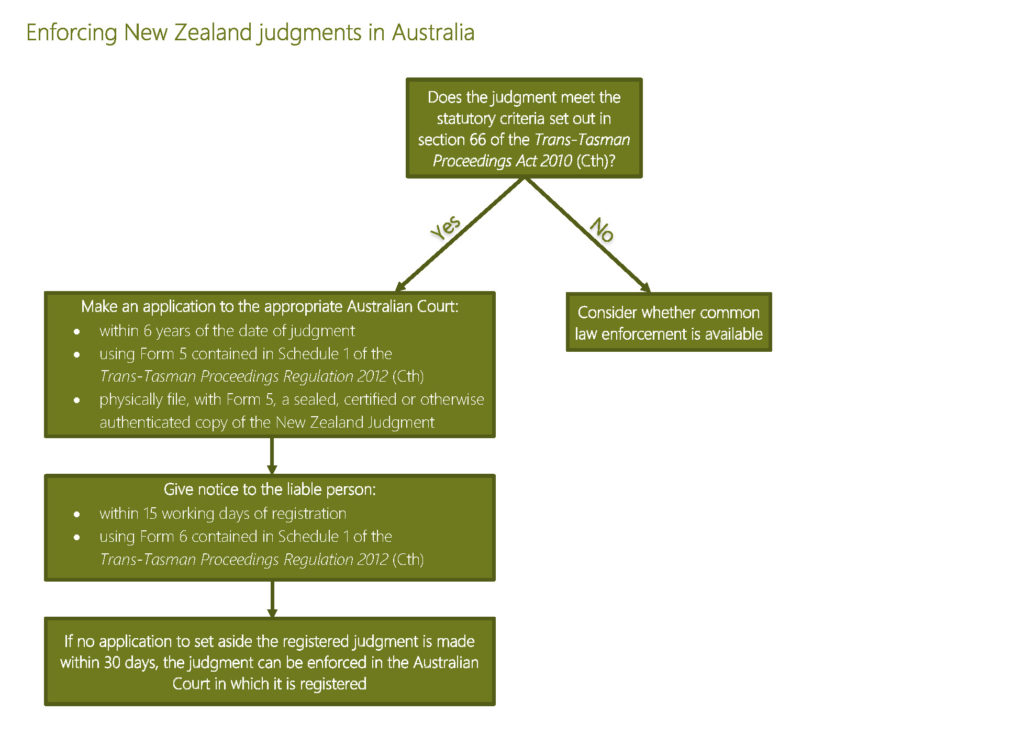Enforcing New Zealand judgments in Australia
Judgment criteria
The registration regime for the enforcement of New Zealand judgments in Australia is contained in Part 7 of the Trans-Tasman Proceedings Act 2010 (Cth).
The types of New Zealand judgments that can be enforced in Australia are broad and include the following:
(a) money judgments;
(b) non-money judgments;
(c) judgments in criminal proceedings that involve an obligation to pay an (d) injured party compensation, damages or reparation;
(e) judgments that involve a regulatory regime criminal fine;
(f) judgments in market proceedings; and
(g) judgments registered under the Reciprocal Enforcement of Judgments Act 1934 (NZ).
The following New Zealand judgments cannot be enforced in Australia:
(a) orders under proceeds of crime legislation;
(b) orders relating to the granting of probate or letters of administration;
(c) guardianship orders;
(d) orders relating to the welfare, control and care of a child;
(e) judgments which are not final and conclusive (including freezing orders); and
(f) judgments which are not enforceable in the original New Zealand Court or Tribunal.
Registering the judgment
An application is filed in the relevant Australian Court. The Australian Court to which you apply to register a New Zealand judgment depends on the subject matter of the judgment. The process is as follows:
(a) judgments (other than judgments that impose a civil pecuniary penalty or a regulatory regime criminal fine) may be registered in any superior Australian Court (i.e. the Federal Court, Family Court or any Supreme Court) or any other Australian Court (except for the High Court) that has the power to give the relief in the New Zealand judgment;
(b) judgments which impose a civil pecuniary penalty (other than a market proceeding judgment) may be registered in any superior Australian Court or any other court that has the power to impose a civil pecuniary penalty of the same value as the penalty imposed by the New Zealand judgment;
(c) judgments to impose a regulatory regime criminal fine (other than a market proceeding judgment) may be registered in any superior Australian Court; and
(d) market proceeding judgments must be registered in the Federal Court.
The application must be in the form prescribed by the Trans-Tasman Proceedings Regulation 2012 (Cth) (Form 5 contained in Schedule 1 to the Regulations) and be filed with a sealed, certified or otherwise authenticated copy of the New Zealand judgment.
In most cases the application will be dealt with by a judicial officer on the papers without appearance in Court.
New Zealand judgments must be registered in Australia within six years of the date of the judgment.
Once registered, the entitled person must give notice of registration to the liable person within 15 working days after registration. This notice must be delivered by registered post to the liable person’s last known address or handed to the liable person.
Once properly registered, the New Zealand judgment has the same force, and may be enforced in the Australian Court, as if the judgment had been given by the Australian Court.
Limited grounds to set aside registered New Zealand judgment
Once a New Zealand judgment has been registered in Australia there are only very limited grounds for it to be set aside. Applications to set aside registration must be made within 30 working days that the liable person was given notice of the registration.
A registered New Zealand judgment can be set aside only on the following grounds:
(a) the judgment is contrary to Australian public policy;
(b) the judgment was registered in contravention of the Trans-Tasman Proceedings Act 2010 (Cth); or
(c) the subject matter of the judgment given was immovable property or an in rem judgment relating to movable property where neither the immovable or movable property was situated in New Zealand.

This publication covers legal and technical issues in a general way. It is not designed to express opinions on specific cases. It is intended for information purposes only and should not be regarded as legal advice. Further advice should be obtained before taking action on any issue dealt with in this publication.
